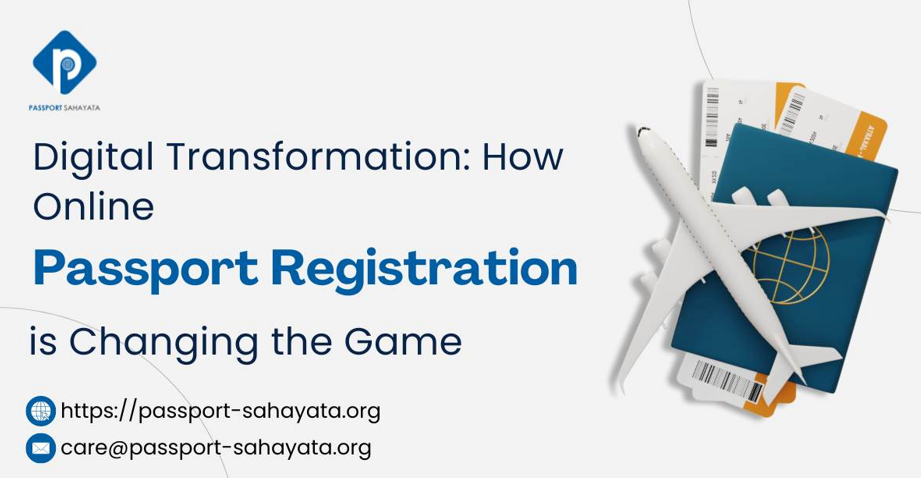In the era of digital transformation, governments worldwide are increasingly leveraging technology to enhance public services and streamline bureaucratic processes. One such significant advancement is the introduction of Apply for passport registration. This digital shift not only simplifies the passport application process but also brings numerous benefits, including increased efficiency, reduced wait times, and improved accessibility for citizens. This article explores how online passport registration is revolutionizing the way we apply for passports, the technological innovations driving this change, and the broader implications for public sector services.
Introduction to Digital Transformation in Public Services
Digital transformation is reshaping various sectors, and public services are no exception. Governments are adopting digital tools to improve service delivery, reduce operational costs, and enhance citizen satisfaction. One of the most impactful developments in this regard is the online passport registration system.
The Evolution of Passport Registration
Traditionally, applying for a passport involved lengthy queues, cumbersome paperwork, and multiple visits to passport offices. This process was not only time-consuming but also prone to errors and delays. However, with the advent of online registration systems, these challenges are being addressed effectively.
Key Benefits of Online Passport Registration
Convenience and Accessibility
Applicants can complete their passport applications from the comfort of their homes, at any time, without the need to visit a passport office. This is particularly beneficial for individuals with mobility issues or those living in remote areas.
Efficiency and Speed
Digital applications streamline the entire process, reducing the time required for application processing and approval. Automated systems minimize the risk of human errors, ensuring a smoother workflow.
Enhanced Security
Online systems often incorporate advanced security measures, such as biometric verification and encrypted data storage, to protect applicants’ personal information.
Cost Savings
For both applicants and governments, online registration reduces the costs associated with printing, mailing, and handling physical documents. It also minimizes the need for extensive staff resources.
Technological Innovations Driving the Change
The success of online passport registration systems hinges on various technological innovations:
Cloud Computing:
Enables storing and processing large amounts of data, ensuring scalability and reliability.
Artificial Intelligence:
Facilitates automated data verification and fraud detection, enhancing security and accuracy.
Mobile Integration:
Allows applicants to use their smartphones to submit applications, upload documents, and track their passport status.
Challenges and Considerations
Despite the numerous benefits, implementing online passport registration systems is not without challenges:
Digital Divide: Ensuring that all citizens, regardless of their digital literacy or access to technology, can benefit from online services.
Data Privacy: Maintaining robust cybersecurity measures to protect sensitive personal information from breaches and misuse.
System Reliability: Ensuring that online systems are resilient, with minimal downtime and quick resolution of technical issues.
Future Trends in Online Passport Registration
The digital transformation of passport registration is an evolving process, with several emerging trends likely to shape its future:
Blockchain Technology
Blockchain offers a secure and transparent way to manage and verify personal data. Integrating blockchain technology into online passport systems could enhance security, reduce fraud, and provide a tamper-proof record of applications and approvals.
AI and Machine Learning
Advanced AI algorithms can further automate the application process, from initial data entry to final approval. Machine learning can help identify patterns and anomalies, improving the detection of fraudulent applications and ensuring higher accuracy in data processing.
Biometric Advancements
Future systems may incorporate more sophisticated biometric technologies, such as facial recognition, iris scanning, and voice recognition. These advancements can streamline the verification process, making it faster and more secure.
Global Interoperability
As digital passport systems evolve, there may be a push towards global interoperability, allowing for smoother and more secure international travel. Collaborative efforts among countries could lead to standardized protocols and shared databases, enhancing the overall efficiency of passport issuance and border control.
Citizen Feedback and User Experience
The success of online passport registration systems depends heavily on user experience and feedback. Governments must prioritize the following aspects to ensure widespread adoption and satisfaction:
User-Friendly Interfaces
The application portals should be intuitive and easy to navigate, with clear instructions and minimal jargon. Multilingual support can also make the process more accessible to a diverse population.
Support Services
Providing robust customer support, including live chat, phone assistance, and comprehensive FAQs, can help address any issues or concerns that applicants may face during the process.
Continuous Improvement
Regularly soliciting feedback from users and incorporating their suggestions can lead to continuous improvements in the system. Governments should conduct surveys, focus groups, and usability tests to identify areas for enhancement.
Transparency
Keeping applicants informed about the status of their applications through real-time updates and notifications can enhance trust and satisfaction. Transparent communication about processing times, potential delays, and required documentation is essential.
Also read: How to apply for Passport and Visa
Conclusion
The digital transformation of passport registration is a game-changer, offering unprecedented convenience, efficiency, and security for applicants. As more governments adopt and refine these systems, the potential for further improvements and innovations is immense. Online passport registration is a testament to how technology can revolutionize public services, making them more accessible and user-friendly for everyone. Embracing these changes can lead to a more efficient, transparent, and responsive government, benefiting citizens and enhancing their experience with public services.


